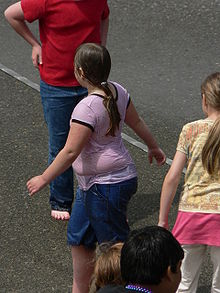Common cold virus may be linked to childhood obesity
Researchers at the University of California, San Diego have found that a common cold virus may be linked to childhood obesity.
In the study of 124 children aged eight to eighteen, kids who had antibodies to adenovirus 36 (AD36) weighed on average 50 pounds more than children who didn’t have the antibodies. When children have AD36 antibodies, that means they had the virus at some point in their life. AD36 causes colds and eye infections.
Comparing the obese children who had the antibodies versus the obese children who didn’t have the antibodies, the kids with the antibodies were significantly more obese, at 35 pounds heavier.
“This shows that body weight regulation and the development of obesity are very complicated issues,” Dr. Jeffrey Schwimmer, the study’s lead author, said. Schwimmer also said that “[i]t’s not simply a case that some children eat too much and others don’t. There are children who eat all the wrong things in all the wrong quantities who are not obese.”
Schwimmer said that he’s not blaming the US childhood obesity epidemic on the virus, but noted that “I’ve seen children who had very brisk weight gain in a given year for reasons that were very hard to pinpoint. These may be the children who have obesity related to this infection.”
The study is backed up by past reports that show the virus boosts production of fat cells. In studies in which animals were infected with AD36, the animals gained a significant amount of weight.
There is currently no vaccine for AD36, and no routine screening for the virus. Dr. Goutham Rao, clinical director of the Weight Management and Wellness Center at Children’s Hospital of Pittsburgh, said that “People want a magic solution. Unfortunately, we don’t have one. What people can do is focus on a child’s behaviors and eliminate the unhealthy behaviors.” Rao also said that “Instead of coming to the doctor and requesting a test for the virus, parents would do better to discuss key behaviors to combat obesity.”
Dr. James Cherry, specialist in pediatric infectious diseases at the David Geffen School of Medicine at the University of California, Los Angeles (UCLA), was also interested by the study. He said that if the link between AD36 and obesity were confirmed, developing a vaccine for the virus could be worthwhile. “More than 20 percent of the obese children in this study were positive for the antibody. If we could prevent 20 percent of all obesity, that would be pretty impressive,” Cherry said.
This article originally appeared in Wikinews.

























Comments